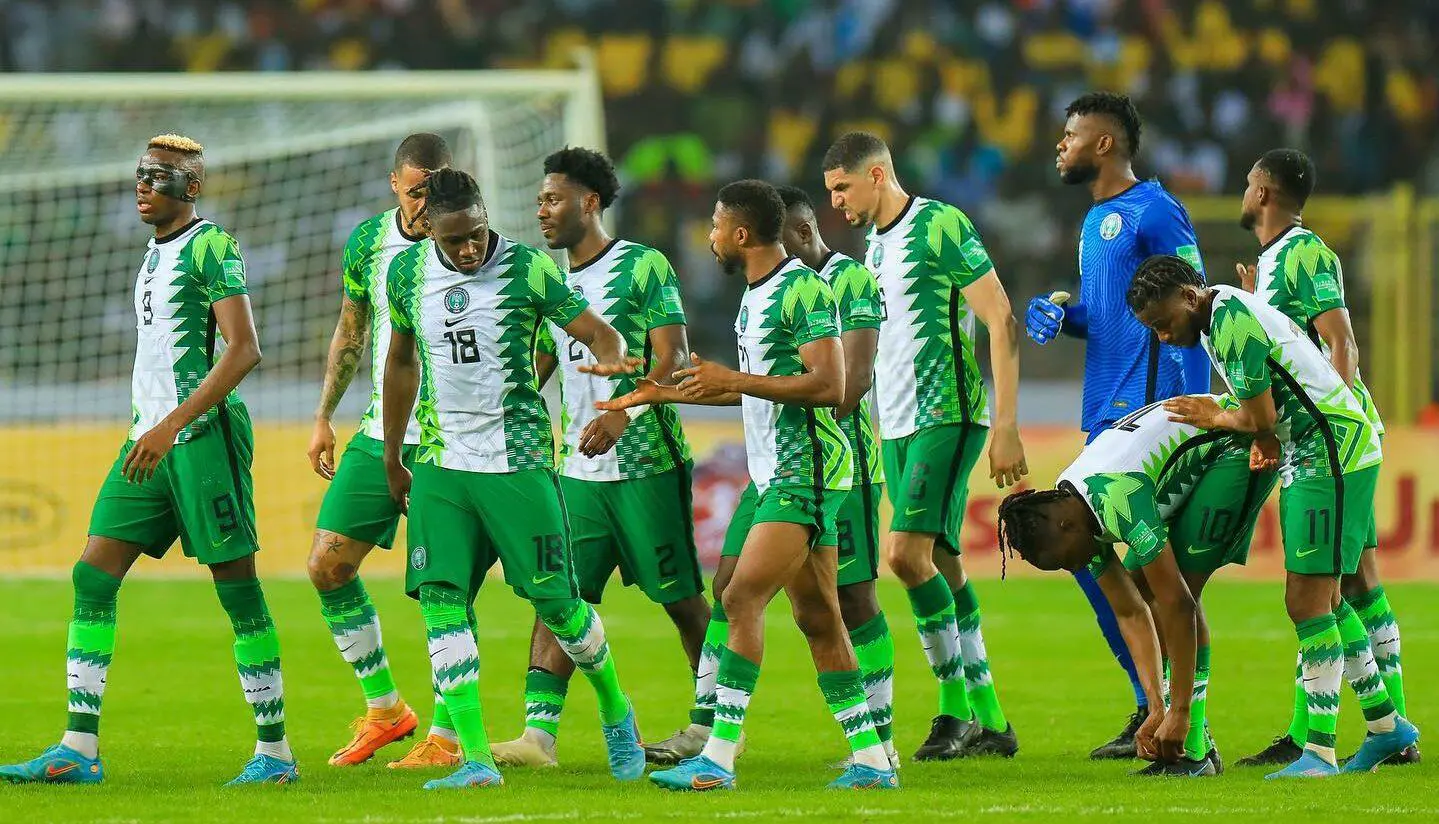Why Nigeria will miss the 2026 FIFA World Cup

GH News Media

The arithmetic is brutal, unforgiving, and increasingly insurmountable. As the Super Eagles of Nigeria prepare for what could be their final gasps in World Cup qualifying, the three-time African champions find themselves staring into an abyss that would have been unimaginable just two years ago.
With only seven points from six qualifying matches, Nigeria's path to the 2026 World Cup in North America has become a mathematical improbability wrapped in tactical mediocrity and systemic failure.
The Group of Death That Became Nigeria's Graveyard
Group C was never supposed to be this difficult for Nigeria. On paper, a group containing South Africa, Benin, Zimbabwe, Rwanda, and Lesotho should have been navigable for a nation that reached three World Cup semi-finals and won three African Cup of Nations titles. Instead, it has become the stage for one of Nigerian football's most spectacular collapses.
South Africa (16) have the chance to book their place from Group C if they win at home to Nigeria (7) on Tuesday, but they will need second-placed Benin (11) to fail to beat Lesotho (6) and Rwanda (8) to not win one of their two fixtures. The current standings read like a damning indictment: South Africa leads with 16 points, Benin sits comfortably in second with 11 points, while Nigeria languishes in fourth place with just seven points – a tally that would embarrass amateur sides, let alone a nation with Nigeria's footballing pedigree.
The gap is not just numerical; it's psychological. Rwanda, ranked significantly lower than Nigeria in FIFA's rankings, has eight points – one more than the supposed regional powerhouse. This isn't just underperformance; it's a complete systemic breakdown of what Nigerian football once represented.
The Mathematics of Failure
The winner of each group will directly qualify for the World Cup, while the four best group runners-up will participate in a second round of qualification. For Nigeria, even the secondary route appears blocked. With South Africa needing just one victory to secure automatic qualification and Benin requiring minimal results to maintain their cushion, Nigeria's fate hangs by the thinnest of threads.
The numbers tell a story of consistent mediocrity. Seven points from eight matches represents a win rate that would struggle to keep teams in lower-tier continental competitions, let alone secure World Cup qualification. Nigeria has averaged less than a point per game in a qualification campaign where dominance was expected, not just hoped for.
Even if Nigeria wins their remaining fixtures, they would need multiple results to fall perfectly into place. South Africa would need to collapse entirely, Benin would need to suffer an unprecedented losing streak, and Rwanda would need to stop their own impressive qualifying run. It's not impossible, but it requires a level of external dependence that no serious footballing nation should accept.
Tactical Stagnation and Strategic Blindness
The problems run deeper than poor results. Nigeria's qualifying campaign has been characterised by tactical inflexibility, questionable team selections, and a fundamental misunderstanding of modern international football.
In an era where smaller nations like Benin have embraced systematic approaches and Rwanda has shown remarkable organisation, Nigeria has appeared rudderless.
The Super Eagles have struggled to break down organised defences, particularly away from home. Their attacking play has lacked creativity and penetration, while their defensive structure has been porous against teams they should be dominating. This isn't about individual talent – Nigeria still possesses players competing at the highest levels of European football. This is about systemic failure at the coaching and organisational levels.
The contrast with their group rivals is stark. South Africa has shown tactical discipline and mental resilience throughout the campaign. Benin have punched above their weight through superior organisation and team chemistry. Even Rwanda has demonstrated a clarity of purpose that has eluded Nigeria throughout this qualifying cycle.
The Weight of History and Expectation
Nigeria's footballing history makes their current predicament even more painful. This is a nation that has qualified for six World Cups, reaching the Round of 16 on three occasions. The Super Eagles were African champions in 1980, 1994, and 2013. They've produced world-class talents who have graced the biggest stages in world football.
But history counts for nothing in qualification mathematics. The current generation of Nigerian players and coaches will be judged not on past glories but on their ability to navigate the present crisis. So far, they have been found wanting.
The psychological pressure is immense. Each dropped point has increased the burden on subsequent fixtures. What should have been routine victories have become must-win encounters, and must-win encounters have become desperate scrambles for points. This pressure has visibly affected the team's performance, creating a vicious cycle of poor results and increased anxiety.
The Benin Factor: When David Consistently Beats Goliath
Perhaps nothing illustrates Nigeria's decline more clearly than Benin's superior position in the group. The Squirrels have 11 points to Nigeria's seven, despite possessing a fraction of Nigeria's resources and footballing infrastructure.
This isn't a one-off upset; it's a sustained period of superior performance that exposes fundamental weaknesses in Nigerian football.
Benin's success has been built on tactical discipline, squad unity, and mental resilience – precisely the qualities that Nigeria has lacked throughout this campaign.
While Nigeria has relied on individual brilliance and historical reputation, Benin has embraced collective responsibility and strategic planning.
The psychological impact of being outperformed by Benin cannot be understated. For Nigerian players and fans, this represents more than just poor results; it challenges the fundamental assumptions about Nigerian football's place in the continental hierarchy.
The Road Not Taken: Alternative Scenarios
Even if Nigeria somehow manages to secure second place in the group, their path to the World Cup remains treacherous. The four best group runners-up will participate in a second round of qualification, meaning Nigeria would face additional qualifying pressure against other desperate nations.
This secondary route offers no guarantees. Other groups contain strong teams who will be equally desperate to avoid World Cup disappointment. Nigeria would face nations with superior qualifying records and potentially better organisation. Given their current form and tactical confusion, there's little reason to believe Nigeria would succeed in such a scenario.
The Final Verdict: A Dream Deferred
As Nigeria prepares for their final qualifying fixtures, the mathematics of failure have become almost impossible to ignore. Nigeria must win at home against Rwanda on Saturday to close the gap, but even victory would likely prove insufficient given the superior positions of South Africa and Benin.
The 2026 World Cup will likely proceed without Nigeria for the first time since 2006. This represents more than just a missed tournament; it's a damning indictment of systematic failures that have plagued Nigerian football for years.
The Super Eagles' World Cup dream hasn't died suddenly. It has been slowly suffocated by institutional chaos, tactical mediocrity, and a fundamental failure to adapt to modern international football. As other African nations have evolved and improved, Nigeria has stagnated and declined.
The road to recovery will require more than new coaching appointments or tactical adjustments. It demands fundamental reforms in how Nigerian football operates, from federation governance to player development to tactical preparation. Without such changes, future qualifying campaigns may yield similar disappointments.
For now, though, the mathematics are clear, and they are brutal. Nigeria's 2026 World Cup qualification hopes are not just unlikely – they are approaching impossibility. The Eagles, for so long soaring above their continental rivals, find their wings clipped by their own failures, watching from below as others take flight toward North America.


